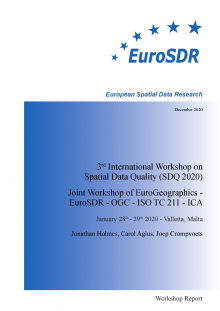Workshop report - Spatial Data Quality (2020)
Demands for spatial data are ever increasing, outstripping the capabilities of the methods by which they have traditionally been provided. New capture methods, improved technology and an increasingly diverse customer base are driving the geospatial industry forward at an alarming rate. Consumers of data recognise the importance of location and expect geospatial information to be readily available, accurate, trustworthy and free.
This fast-evolving landscape necessitates that data quality and quality management must evolve to embrace the new technologies, methods of data capture and date use. To maintain their long-standing role of providers of trusted official data, National Mapping and Cadastral Agencies (NMCAs) have to keep up with these evolving needs and trends.
The international workshops on Spatial Data Quality are organised specifically to bring together producers, users, academia and software suppliers into one event to provide innovative and original contributions to the ongoing debate on spatial data quality. They are organised and hosted by two notfor profit entities: EuroGeographics, the association for Europe’s National Mapping, Cadastral and Land Registry Authorities, and EuroSDR, the network of European geographic information organisations and research institutes.
Following previous successful workshops in 2015 and 2018, EuroGeographics and EuroSDR, in conjunction with OGC, ISO and ICA, organised a third workshop on spatial data quality in Valletta, Malta in January 2020. The workshop was sponsored by 1Spatial.
The topics presented at the workshop were many and varied, as demonstrated by the papers and abstracts provided in this publication. The richness of the discussion and debate is illustrated by the broad scope of the topics and subject matter of these papers. Quality issues are varied and must be considered from different points of view. EuroGeographics and EuroSDR are proud of the range of themes covered in this publication.
Highlights include examples of how national data providers are meeting the challenge of managing quality from multiple suppliers and how new methods are enabling them to do so. Several papers cover these areas. Users are interested in locating and using data and we have examples of how data suppliers can communicate this information to end-users in new and informative ways. Authoritative data and its provenance are discussions close to the hearts of both national geospatial data providers and users as demonstrated in two papers presented here. Also included are case studies of good practice in implementing quality at the heart of production, whilst other papers provide an overview of data quality perspectives in e-Government. No discussion covering spatial data quality is complete unless it touches on standards, the topic here being the motivation for revising ISO 19157:2013 Geographic Information – Data Quality.
These papers are provided as an illustration of the rich and broad conversation around quality which is engaging data providers, researchers and users of geospatial data. We hope that their publication will contribute to the ongoing debate around spatial data quality and how best to measure it.

